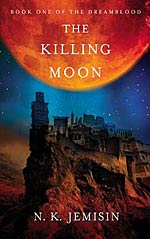
![]() Skynjay
Skynjay
2/6/2013
![]()
"In the ancient city-state of Gujaareh, peace is the only law. Upon its rooftops and amongst the shadows of its cobbled streets wait the Gatherers - the keepers of this peace. Priests of the dream-goddess, their duty is to harvest the magic of the sleeping mind and use it to heal, soothe... and kill those judged corrupt." Cover blurb from 'The Killing Moon.'
How to describe a book as unique as this? Assassin tale? Well, maybe, but to lump this in with the thousand books with a man in a cloak on the cover would be a travesty. Several have tried to make their assassins unique, but in this book the protagonist would resent even being called an assassin. Try again. Distopia? After all, the limit of what humanity will allow in keeping such a long and stable peace works right in with Orwell and the like. But perhaps not, distopias usually deal with a possible future, and this is still very much a fantasy novel. Vampire tale? Hell, I was three quarters through the book before I recognized that this may be the most cleverly hidden vampire tale I have seen, I certainly don't want it lumped in with that over saturated genre. I guess completely unique epic fantasy is the best I can do.
A lot of important little touches went in to building this unique experience. While there is an Egyptian flair, it was not the typical "add a pyramid and now it's not a western influenced fantasy." Rather the author changed everything; flood cycles instead of years, counting by fours, and adding a caste system that varied between the different city states. As readers we are dropped right into the world, with no long info dumps holding our hands. This may slow down the early book as a reader tries to keep up, but also worked to keep the book from every feeling bloated. The religion is unique, the world is alive, and the city of Gujaareh feels completely real.
The story itself deals with a Gatherer named Ehiru who discovers that corruption may be staining everything he thought he stood for. He is a hard man to like, as the gatherers are in effect assassins fully confident that they are doing the blessed work for the Goddess Hananja. They have the ability to walk into dreams, displace the soul and send it to a better place, and gather the 'dreamblood' which they take back to sharers who can use it healing. At times they are used as a euthanasia, helping send the terminally ill out with honor. At others they are sent to 'gather' from those judged corrupt by the order. All combined, this process makes the city a virtual utopia. Very little crime or sickness, lack of corruption keeps starvation and other problems down. A true 'city on the hill."
Though Ehiru is the focus, it is through Nijiri, his apprentice, that we really understand him. They share a bond that neither want to call love, and the trials they go through together near the end of the book are powerful moments. Sunandi is the last piece of the main cast, a woman Ehiru is sent to 'gather,' but instead provides information that may prove life changing for all of Ehiru's order. She also provides a conscience to Nijiri that he was never given during his training. Is there cause really just? How much is peace worth, and how far should a man be able to go to achieve it? If gathering is beneficial to all, why is it so hard on the gatherers, and more importantly, so hard for them to stop?
My qualms are so minor as to be almost not worth mentioning. I didn't quite understand how Gujaareh had avoided war with its neighbors for so long, even with the use of magic. And I didn't understand how an entire city could be serviced with so few gatherers. And that is it, usually I have a list of nitpicks even on my favorite books, and in this book I have two. The book was so good I even read the glossary provided at the end to see if there was anything more about the world I could pick up.
5 stars, highly recommended.
http://fantasyreviewbarn.blogspot.com/